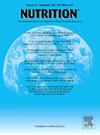坚持无麸质饮食、抑郁和乳糜泻参与者的营养分布
IF 3.2
3区 医学
Q2 NUTRITION & DIETETICS
引用次数: 0
摘要
背景乳糜泻(CD)提出了艰巨的挑战,需要严格遵守无谷蛋白饮食(GFD)。目的在本研究中,我们探讨了无谷蛋白饮食对乳糜泻患者抑郁症的影响,分析了不同背景下抑郁症的患病率,并仔细检查了宏量和微量营养素的分布。方法:综合数据跨越国家健康和营养调查周期(2009-2014),包括70名乳糜泻参与者和271名报告一般麸质问题的个人。采用SAS v9.4,合并周期使用唯一标识符进行仔细检查,并辅以减少偏差的样本权重和研究设计。结果线性回归没有发现明显的抑郁,但CD/GFD相关性和种族有显著性意义。白人的乳糜泻患病率为0.12,是其他种族的3到6倍,其中女性的患病率是白人的两倍。营养缺乏出现在乳糜泻和GFD的情况下,包括碳水化合物摄入量与乳糜泻/GFD之间的负相关。GDF组显示PUFA消耗减少,而必需微量营养素(包括维生素B1、D和E以及钙)的缺乏也在GDF组中显著出现。结论本研究深入探讨了饮食、心理健康和乳糜泻因素之间复杂的相互作用,为乳糜泻患者的最佳管理策略提供了全面的见解和整体框架。本文章由计算机程序翻译,如有差异,请以英文原文为准。
Adherence to a gluten-free diet, depression, and nutrient distribution in participants with celiac disease
Background
Celiac disease (CD) presents formidable challenges, requiring rigorous adherence to a gluten-free diet (GFD)
Aim
In this study we probed the impact of GFD on depression in people with CD, analyzing depression prevalence across diverse backgrounds and scrutinizing the distribution of macro- and micronutrients.
Methods
Comprehensive data spanning National Health and Nutrition Examination Survey cycles (2009–2014) encompassed 70 CD participants and 271 individuals reporting general gluten issues. Employing SAS v9.4, merged cycles were scrutinized using unique identifiers, bolstered by sample weight and study design that reduced bias.
Results
While linear regression uncovered no significant depression, CD/GFD link and ethnicity exhibited notable significance. CD prevalence registered at 0.12 in Whites, a striking 3 to 6 times higher compared to other ethnic groups, with females encountering twice the prevalence. Nutritional deficits surfaced within both CD and GFD contexts, inclusive of negative correlations between carbohydrate intake and CD/GFD. The GFD cohort displayed reduced PUFA consumption, while deficiencies in essential micronutrients, encompassing Vitamins B1, D, and E, as well as calcium, also emerged prominently with the GDF group.
Conclusion
This study delved into the intricate interplay of dietary, mental health, and CD factors, furnishing comprehensive insights and a holistic framework for optimal management strategies for CD patients.
求助全文
通过发布文献求助,成功后即可免费获取论文全文。
去求助
来源期刊

Nutrition
医学-营养学
CiteScore
7.80
自引率
2.30%
发文量
300
审稿时长
60 days
期刊介绍:
Nutrition has an open access mirror journal Nutrition: X, sharing the same aims and scope, editorial team, submission system and rigorous peer review.
Founded by Michael M. Meguid in the early 1980''s, Nutrition presents advances in nutrition research and science, informs its readers on new and advancing technologies and data in clinical nutrition practice, encourages the application of outcomes research and meta-analyses to problems in patient-related nutrition; and seeks to help clarify and set the research, policy and practice agenda for nutrition science to enhance human well-being in the years ahead.
 求助内容:
求助内容: 应助结果提醒方式:
应助结果提醒方式:


